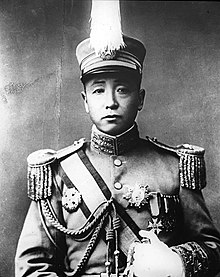
Back تشانج تسولين ARZ Zhang Zuolin Catalan Čang Cuo-lin Czech Zhang Zuolin Danish Zhang Zuolin German Ĵang Zuolin Esperanto Zhang Zuolin Spanish Zhang Zuolin Basque Zhang Zuolin Finnish Zhang Zuolin French
Zhang Zuolin | |
|---|---|
張作霖 | |
 Zhang in military regalia | |
| Generalissimo of the Military Government of China | |
| In office 18 June 1927 – 4 June 1928 | |
| Premier | Pan Fu |
| Preceded by | Wellington Koo (as acting president) |
| Succeeded by | Tan Yankai (as chairman of the national government) |
| Warlord of Manchuria | |
| In office 1922 – June 4, 1928 | |
| Succeeded by | Zhang Xueliang |
| Personal details | |
| Born | March 19, 1875 Haicheng, Fengtian, Qing Empire |
| Died | June 4, 1928 (aged 53) Shenyang, Fengtian, Republic of China |
| Manner of death | Assassination |
| Nationality | Chinese |
| Political party | Fengtian clique |
| Spouses |
|
| Children | 14, including: |
| Awards | Order of Rank and Merit Order of the Golden Grain Order of Wen-Hu |
| Nickname(s) | Old Marshal Rain Marshal Mukden Tiger King of the Northeast |
| Military service | |
| Allegiance | |
| Years of service | 1900–1928 |
| Rank | Grand Marshal of the Republic of China, generalissimo |
| Battles/wars | |
This article needs additional citations for verification. (April 2024) |
Zhang Zuolin[a] (March 19, 1875 – June 4, 1928) was a Chinese warlord who ruled Manchuria from 1916 to 1928. He led the Fengtian clique, one of the most important factions during China's Warlord Era. During the last year of his life, he briefly installed himself as President of the Republic of China.
Born to a poor-peasant’s family in Manchuria. At the age of twenty, he enlist as a cavalry soldier to fight in the First Sino–Japanese War (1894–1895). After the end of the war, he returned to his hometown and became a bandit. From the time of banditry arose his closeness to some figures who later occupied important positions in his military clique. As the weakness of the empire after the Boxer rebellion caused the bandit groups of the region to become the only important military force in the area, so the authorities tried to attract them. Thus, all his bandits gang joined the regular army in 1903. After the Russian-Japanese War, Zhang's forces maintained their ambiguous character of regular military unit and outlaw gangs.
He played a prominent role in the 1911 Revolution in Fengtian. In 1916, he was appointed Fengtian’s Civil and Military Governor and in 1919, he had already taken control of the three northeastern provinces–Fengtian, Jilin and Heilongjiang. He controlled these territories until his death in 1928 as Commander-in-Chief of the Fengtian clique, which grouped his supporters. Considered as one of the main military leaders; from 1918 he began to extend his power into Mongolia and northern China. At the beginning of 1925, it became the most powerful military leader in the north of the country. However, He became the important target for the Kuomintang’s Northern Expedition in 1926 directed against the Beiyang government that was dominated by him.
He managed to influence national politics thanks to the great resources he obtained from the exploitation in northeastern provinces, where was plentiful, sparsely populated and in full development, and to the protection granted to them by successive Japanese. He gathered around him his clique, made up of both military and skilled civilian administrators, who remained fundamentally faithful. Believing the anti–nationalist and communist led he harshly repressed the urban protests that spread throughout the country in 1925. His survival in the middle 1920s was due to the determined Japanese support; for Japanese, Zhang was the best person to defend his interests, compared to other military leaders.
Increasingly enmity with the Japanese, who wanted him to abandon his national ambitions to concentrate on reforming the northeastern provinces in favor of their interests, Zhang was assassinated by Kwantung’s officers in 1928. At that time, He was in full retreat to his bases in the northeast before Generalissimo Chiang Kai-shek’s offensive. Zhang Xueliang, his son, maintained control of the northeastern provinces until 1931.
Cite error: There are <ref group=lower-alpha> tags or {{efn}} templates on this page, but the references will not show without a {{reflist|group=lower-alpha}} template or {{notelist}} template (see the help page).
© MMXXIII Rich X Search. We shall prevail. All rights reserved. Rich X Search